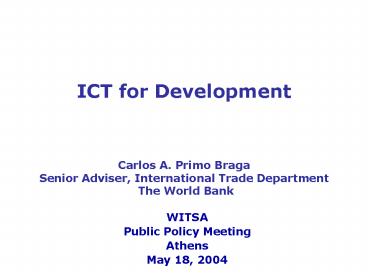ICT for Development - PowerPoint PPT Presentation
1 / 20
Title:
ICT for Development
Description:
ICT for Development. Carlos A. Primo Braga. Senior Adviser, International Trade Department ... Difference due to physical and human capital ... – PowerPoint PPT presentation
Number of Views:157
Avg rating:3.0/5.0
Title: ICT for Development
1
ICT for Development
Carlos A. Primo BragaSenior Adviser,
International Trade Department The World Bank
WITSA Public Policy Meeting Athens May 18, 2004
2
Outline
- ICT and Development
- The Regulatory Environment
- Reality check
- Concluding remarks
3
Knowledge makes the difference between poverty
and wealth
Thousands of constant 1995 US dollars
14
Rep. of Korea
12
Difference attributed to knowledge
10
8
6
4
Difference due to physical and human capital
2
Ghana
0
1960
1965
1970
1975
1980
1985
1990
1995
2000
Source World Development Report, 98/99
4
Knowledge Changes the Development Process
- Creation and effective use of knowledge are key
to rapid economic growth - ICT is changing the terms under which knowledge
can be created and disseminated - - ICT facilitates the process of codification and
transmission of knowledge about technology - - ICT enhances the positive learning
externalities of knowledge generation by
magnifying the possibilities for recombination of
ideas and information - - ICT dilutes the tyranny of geography by
providing new ways for researchers to escape
national boundaries. The rate of international
co-authorship of scientific and technical papers,
for example, has increased significantly over the
last decade - - ICT increases the distribution power of
innovation systems, diminishing the time to
market of new products and services, while
enhancing the dissemination, application, and use
of mature technologies.
5
But can ICT be of any help in LDCs?
6
ICT and development
- ICT and Economic Growth - enhanced
competitiveness - increased business
opportunities - access to market for
rural communities - ICT and Improved Delivery of Social Services
- - health/education/environmental/microfinance
services - reducing vulnerability to natural
disasters - ICT for Greater Transparency
- - improved efficiency on government procurement
- - reduced corruption
- - increased civil society participation
- ICT for Empowerment of the Poor
- - allowing the poor to better communicate their
concerns
7
The concept of sustainable development
Economic Sustainability (productivity)
Intergeneration Concerns
Social Sustainability (equity)
Environmental Sustainability (protect/enhance
natural resources)
8
ICT and sustainable development
Direct Impact
Indirect Impact
- Production
- - Toxic components such as lithium and cadmium
(batteries), lead (cathode ray tubes)... - Operation
- - Energy use
- Disposal
- - Short lifetime cycle, growing challenge of
managing electronic waste
- Effects on transportation of e-commerce and
telework - - Growth vs. more efficient logistics vs.
leisure choices - Dematerialization
- - e-books MP3 files vs. CDs email vs. snail
mail - Acceleration of life-cycle of products
- - Incentives for agglomeration vs. dispersion
Network Effects
Opportunities for more knowledge sharing,
improved coordination, transparency and monitoring
9
Virtualization of material products myths and
reality
10
Digital divide
- Infrastructure (income levels, rural vs. urban)
- Digital literacy (barriers to absorption of IT)
- Content
- Gender
- Large companies vs SMEs
- E-business practices
11
The network explosion
12
Digital divide/infrastructure
Income Divide
User distribution, by income group, 2001
6.1 billion
986 million
741 million
361 million
100
90
High Income
80
70
Upper-mid Income
60
50
Lower-mid Income
40
Low Income
30
20
10
0
Population
Telephone lines
Mobile users
Internet users
Source ITU World Telecommunication Indicators
Database
13
Telecoms and Internet the cost of being
connected
300
250
200
150
278
100
191
50
80
60
1.20
0.135
0
Source Human Development Report Office
calculations based on data ITU 2000 and World
Bank 2001
14
Secure servers and e-commerce
Share of Secure Servers in non OECD
countries (October 2000)
Source OECD, 2001
15
Facilitating trade in less efficient countries
would bring significant gains services/e-business
are key in promoting trade facilitation
Source Calculations based on table 4 in Wilson,
Mann, and Otsuki, Trade Facilitation and
Capacity Building Global Perspective, 2003,
mimeo.
16
The regulation maze
17
Reality check implications for developing
countries
- Infrastructure rapid improvement but major gaps
in coverage/affordability - Regulatory environment progress complexity
(cyberlaws, security, PKI, IPRs, content
regulation, e-payment infrastructure, privacy) - Digital literacy institutional constraints in
the educational sector IT HR development at
firm level - Content localization/relevance/IPRs
18
Concluding remarks
- E-business and ICT use will continue to expand on
a global basis and their benefits can be
substantial not only at firm level, but also in
promoting trade and enhancing productivity at a
macro level - Convergence in e-business practices can happen
(developing countries and industrialized
countries, SMEs and large enterprises), but - Unless governments provide the proper regulatory
environment for private action and support
efforts to expand digital literacy, with special
attention to the needs of SMEs, the digital
divide between the developed and the developing
world, at the level of business practices, will
widen.
19
Concluding remarks (cont.)
- More evolution than revolution, but potential for
significant distribution impacts (within nations
and internationally), particularly, as e-commerce
practices spread. - Importance of keeping in focus the implications
of the regulatory environment for innovation - Cross-border disputes will also expand in the
absence of regulatory convergence (no hope for
advancing this agenda in a significant manner in
the WTO in the near future ).
20
More information
- The World Bank
- www.worldbank.org
- Development Gateway Portal
- www.developmentgateway.org

